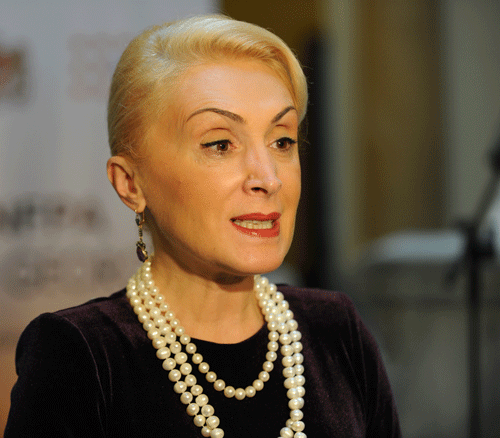Female representation in government is highest within the executive authority (15.7%). There are 3 female ministers out of 19. Women within local government are 11.5% and only 6% of female MP’s are in parliament.
According to figures provided by the Central Election Commission for the May,2008 parliamentary election, there were only 53 women out of 443 major deputies. As a result of the election, only one woman entered the parliament among 73 major deputies.
NDI Georgia: In recent years, Georgia has seen a decrease in political participation by women, at least in the arena of electoral politics and at the cabinet level. In 2008, the percentage of women members of parliament (MPs) dropped from 9 percent to 6 percent. The numbers were even less encouraging in the 2010 local elections. In the lead up to the 2012 Parliamentary election, NDI Georgia has plans to work with the political parties to encourage them to nominate more women.
Though the representation of women in parliament was low, the posts they were holding were rather impressive. Nino Burjanadze held the position of parliament chair from 2001 to 2008.
In 2008,RusudanKervalishvili held the title ofDeputy Chair of Parliament. Additionally, Khatuna Gogorishvili was the head of Procedural Issues and theRules Committee in the Georgian Parliament-.
In total, there werenine major female deputiesin the 2008 parliament :Anikashvili Magdalina By party list: Giorgi Targamadze – Christian-Democrats; Gogorishvili KhatunaBy party list, Unified National Movement- for Victorious Georgia jabua Guranda By party list, Unified National Movement – for Victorious Georgia Javakhadze Elene By party list, Unified National Movement – for Victorious Georgia Kervalishvili RusudanMajority, Unified National Movement – for Victorious Georgia Kherkheulidze Ekaterine By party list, Unified National Movement – for Victorious Georgia Ochiauri Khatuna By party list, Unified National Movement – for Victorious Georgia Taktakishvili Chiora By party list, Unified National Movement – for Victorious Georgia Verulashvili Marika By party list, Unified National Movement – for Victorious Georgia.
The representation of women is less then desired in village municipality, which is the lowest level of local government.
The reason which has negative effect over women active involvement in politics is different – starting with legislation, ending with the traditional gender stereotypes existing in society.
The Georgian Constitution and other legislation ensure gender equality. In fact, Georgia has ratified several international documents which prohibit discrimination. These are: the “Universal Discrimination of Human Rights”, the “International Pact on Civil and Political Rights” and the “Convention on the Elimination of all Forms of Women Discrimination”. However, the equality is still quite problematic in practice. One of the reasons is that Georgian legislation is gender neutral – there are no such laws that can promote gender equality. It should be noted that in such cases, instituting quotas for women is widespread practice used to increase the participation of women in politics. “Though the adoption of a quota system in Georgia would likely yield a higher percentage of female participants in politics, the whole of Georgian society went against this adoption, including all the member parties of the Gender Equality Advisory Council under the Chairman of the Parliament of Georgia.” – said Rusudan Kervalishvili. The main argument by those who opposed the adoption of the quota system was the fear of employing unqualified staff in parliament.
Though no gender quota system operates in Georgia, Rusudan Kervalishvili, hopes that the situation can be improved by setting quotas in political parties. Neither of political parties has responded to this initiation yet.
It should be noted that in 2010, the Georgian Parliament adopted new law on gender equality. However, an action plan is being developed at the moment.
“Gender equality is one of the most important issues as regarding human rights. Unfortunately, now the women representation in a decision making bodies is very low” – told Rusudan Kervalishvili to the Human Rights House Tbilisi.
Currently, the majority of the women in parliament are representatives of the ruling party; thus experts advice opposition to involve more women in their activities.
The gender policy in political parties and the interest of the society towards gender issues, somehow, has influence over the women participation in decision-making process.
The Deputy Chairperson of the opposition party “Our Georgia – Free Democrats”, Tea Tsulukadze states: “The more women that are in political party the better it will be. Currently there are 2 women in the party administration; one of them is deputy chairperson. In addition,approximately 150 women are united in our women movement. As for the districts, the women are more actively involved there. Out of seven regional offices, the head of one of the regional organizations is a woman. “
According to the adviser of gender issues at UN, Taman Sabedashvili, it is very important to form public opinion about gender.
“Research on the public values conducted by Open Society Georgia showed that Georgian society doesn’t yet see women in politics. Thus, in order to improve the situation with regards to gender equality, public opinion should be formed.” – said Tamar Sabedashvili, Adviser of Gender Issues in UN. “Women should be 3-4 times more elected. The obstacle for women is that during an election, men and women are in unequal situations; usually men have more financial possibilities then women” – said the Head of the Women Party Guguli Magradze.
“I have nothing against women in politics; I generally think that the intellectual capability of a person doesn’t depend on gender. Though I should say, that I personally prefer a man with business interrelation then women, I don’t know why”- said Salome Achba, a 21 year-old intern at HRIDC.
Psychologist Nato Zazashvili said that “the more that women are in politics, the more women’s issues and problems will be advanced.
“I have never been discriminated against because of sex, but I have felt the sentiment of “go home, bring up your kids and give up politics” said Tina Khidasheli one of the leaders in the Republican Party.
Shorena Latatia





